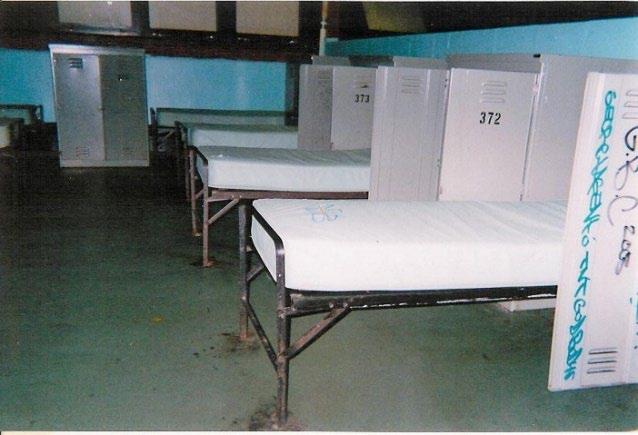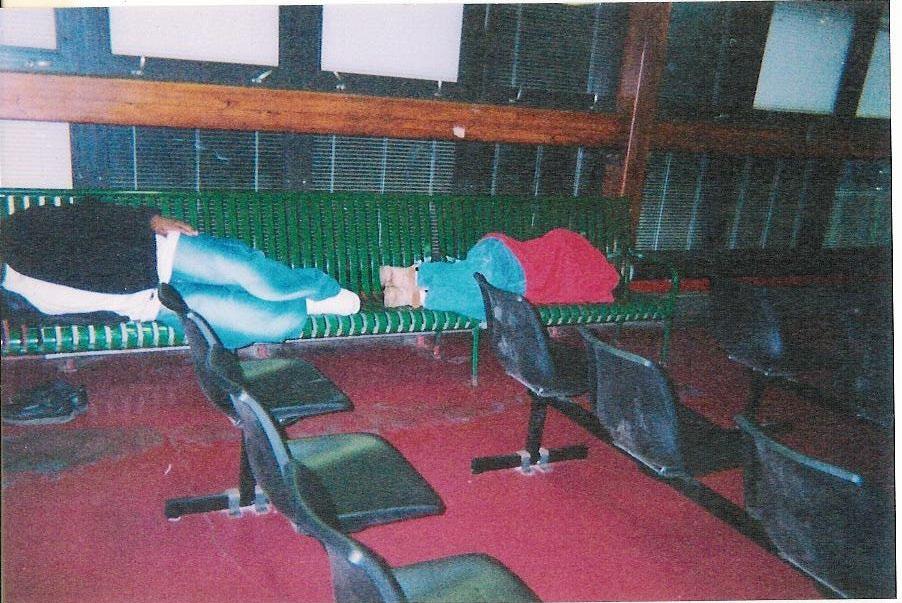
4 minute read
2005: WARDS ISLAND SHELTER
The Wards Island Shelter Complex was within walking distance of PTH’s office on 116th Street. Nearly 1,000 homeless (mostly) men were sheltered on Wards Island, in dormitory style shelter, sleeping on cots with small lockers for their belongings. During outreach, PTH met a lot of men coming from the shelter at 125th and Lexington Avenue, and at times rode the bus over to Wards Island to do outreach. Conducting surveys and listening to folks, PTH identified several issues with Wards Island.
Sam J. Miller: That's where the bus stop is. That's where there's always, at any given moment, a ton of mostlymen , but not exclusively who are homeless, who are waiting on the bus to go to the several shelters that are on Wards Island, and you know… There’s also several methadone clinics in the area.
It's just sort of like this very stark, horrific example of the ways that folks are forced into vulnerable situations, where they're also really heavily policed. You know, there was a heavy, heavy police presence there. There still is. The subway station is just downstairs from there, and there are always tonsofcops there . More than any other station I know of. More than Times Square, which is supposedly this terrorist target hot spot. But the underground economy at 125th is more of a threat to public safety, evidently.
Wards Island Shelter Surveys and Documentation.
On December 8, 2005, the shelter campaign raised several issues impacting people staying in the Wards Island shelter complex that had been identified over the course of several months. These issues reflected the experience of the majority of shelter residents that PTH met during outreach. PTH’s shelter campaign reached out to DHS with issues as well as recommendations.
Issues included a lack of transportation to and from Wards Island for shelter residents in wheelchairs, maintenance issues including a lack of hot water, lack of nutritious food, staff treating shelter residents like prisoners, lack of safety, illegal close-outs and throwing shelter residents belongings away, taking away beds for no reason.
Marcus Moore: I just felt like I cannot justbehere in this space where I was at on Wards Island. People needtoseethis . And so I interviewed some of the men there.
I just knew deep down inside my soul that I had to go and interview some of these guys around here because they was really experiencing some real tough hardship that was going on in the shelter system at that time. And I was able to make them feel comfortable and relaxed to talk on camera and I was just documenting stuff that was going on at the time when I was in the shelter, where the shelter was like my residence for a little while.
People will complain, but I felt like I needed to do something. I didn't know Picture the Homeless like that, yet. But I knew that I had to document stuff that was going on where I was living in the shelter at the time. I was documenting and interviewing people in a shelter even before I got a chance to have opportunities with Picture the Homeless to do certain types of media work.
I can remember that people was in the shelter system for so long. I got them to talk about that on camera. The food was, was very sickening, you know? People were complaining about the showers. People was doing things in the showers where people have to wash up, and it wasn't sanitary, you know? Sometimes some of us don't need to be in the shelter, some of us need to be in a nursing home. And it was just like social issues within the system that people are being neglected.
Some people wasn't comfortable, that's understandable but I got people to talk about that. People was able to get stuff off their minds and I thought that was very important to do. I felt somewhat like it was my job to do it. And today I still feel the same way, you know. So, that's what I was doing at that time to help me to get through all this, this muck of why people are in the shelter system this long.
Some of them just been bouncing around from one building to the next, some of them been there, three years, six months, nine months, a year, you know… It was really frustrating for me to just hear this.
And it just got to the point where people was doing things desperately, like taking pills just to get housing fast. Be cause if you take some kind of pills and the doctor could provide a description, and make it out that you need some extra attention—then you get your place faster. To this day that's not talked about enough.
I'll never forget when fellows was trying to get me to take this pill, so I can get my housing faster… I came into the shelter system as healthy dude, and I left as a healthy individual in my right state of mind.
So, I realized that people was endangeringtheirhealth to able to get some form of housing and they didn't care what they did to their bodies to get it to be diagnosed of whatever type of degree of health that you would have to have your own housing immediately , as opposed to waiting for the system to house you because you're able bodied, so you could just get out there get a job or something, and do your own housing.
But I learned that a lot of men at the time, because I was in a men's shelter, they just got to the point where they just endangered their health, they didn't care no more. They're gonna, take thesepills , and get checked out by the doctor where they have to address them to some kind of housing package immediately.








